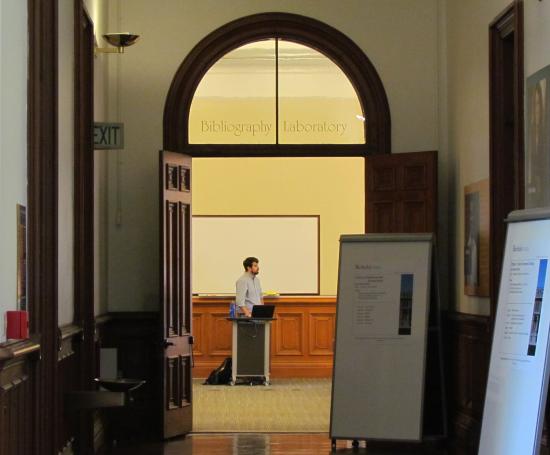Ph.D. Research Reception
Join us as Ph.D. students from the School of Information share their innovative research.
The Ph.D. program at the School of Information draws doctoral students from a wide array of disciplines whose interests and approaches are as varied as their backgrounds. Though they all take technology as their object of study, our Ph.D. students approach the topic from many different angles — economic, political, social, legal, ethical — in an effort to understand the present impact and future development of information technology.
Schedule
| 3:00 pm | Welcome & Opening Remarks |
| 3:15 pm | The Distressing Ads That Persist: Uncovering The Harms of Targeted Weight-Loss Ads Among Users with Histories of Disordered Eating Liza Gak |
| 3:30 pm | A Sociocultural Explanation of Internet-Enabled Work in Rural Regions Zoe Kahn |
| 3:45 pm | Break |
| 3:55 pm | Google Says So(S): The Entanglement of Search Engines and Ballot Proposition Information Emma Lurie |
| 4:10 pm | Adaptive Sampling for Fair Machine Learning Satej Soman |
| 4:30 pm | Reception |
Presentations
The Distressing Ads That Persist: Uncovering The Harms of Targeted Weight-Loss Ads Among Users with Histories of Disordered Eating
Liza Gak
Trigger Warning: This presentation includes media that could be triggering, particularly to people with an eating disorder.
Targeted advertising can harm vulnerable groups when it targets individuals' personal and psychological vulnerabilities. We focus on how targeted weight-loss advertisements harm people with histories of disordered eating. We identify three features of targeted advertising that cause harm: the persistence of personal data that can expose vulnerabilities, over-simplifying algorithmic relevancy models, and design patterns that increase engagement but can also encourage unhealthy behavior. Through a series of semi-structured interviews with individuals with histories of unhealthy body stigma, dieting, and disordered eating, we found that targeted weight-loss ads posed a range of negative emotional and physical outcomes, placing a burden of individual responsibility on the user. At the same time, we observed that targeted individuals demonstrated agency and resistance against distressing ads. Drawing on scholarship in postcolonial environmental studies, we use the concept of slow violence to articulate how targeted advertising inflicts concrete harms on vulnerable populations.
A Sociocultural Explanation of Internet-Enabled Work in Rural Regions
Zoe Kahn
In this talk, I will draw on ethnographic research conducted with Professor Jenna Burrell in three rural places in the Western United States to understand how rural workers incorporate the Internet into their work practices. We find two key, divergent types of work in rural areas that leverage the Internet: (1) telework and (2) work to market and sell goods and services online. We consider why these two forms of Internet-enabled work are pursued by different segments of the rural population, attending to the socio-demographic variation within and between these two broad categories. Some key differences include whether workers are urban transplants or rural-originating, in “white-collar” or “blue-collar” occupations, and whether they are men or women. We argue that deficit framings that focus on inadequate infrastructure or absent skills are insufficient to understand such patterns of differentiated use. Instead a sociocultural explanation is needed: one that draws connections between work cultures, occupational values, skills, and practices.
Google Says So(S): The Entanglement of Search Engines and Ballot Proposition Information
Emma Lurie
In the days leading up to the 2020 election, individuals online raised concerns that people who sought information about the California ballot propositions were displayed biased information on Google search engine result pages. We conduct a small-scale algorithm audit and analysis to investigate claims of search engine bias in the search results. We find that while the majority of search snippets do not take a clear stance towards the proposition, and we find no evidence of the search engine manipulation effect, some neutral government sources were incorrectly summarized on the Google search snippet algorithm. We then reflect on best practices of how experts can investigate grassroots claims of algorithmic bias.
Adaptive Sampling for Fair Machine Learning
Satej Soman
As machine learning approaches are increasingly leveraged in policy decisions, ensuring fair outcomes in these situations becomes increasingly important. We present a variance-reduction approach to fair ML based on kernel methods and study a specific social benefit program in Togo.










